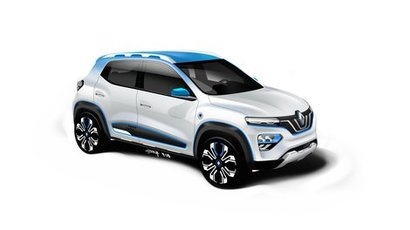
Groupe Renault unveiled showcar Renault K-ZE, a new global A-segment, SUV-inspired electric vehicle, capable of 250 kilometres/155 miles which is also easy to charge thanks to a double charging system compatible with domestic plugs and public infrastructures. The vehicle will incorporate a range of features including rear parking sensors, rear view camera and a central screen with connected navigation and services. The K-ZE will be launched in China initially, given that it is currently the largest and fastest-growing market for EVs, where it will be manufactured locally by e-GT New Energy Automotive Co, the Joint Venture with Dongfeng Motor Group and Nissan created to develop and produce competitive electric vehicles for the Chinese market.
“Groupe Renault was a pioneer and is the European leader in electric vehicles” said Carlos Ghosn, Chairman and CEO of Groupe Renault. “We are introducing K-ZE, an affordable, urban, SUV-inspired electric model combining the best of Groupe Renault: our leadership in EV, our expertise in affordable vehicles and in forging strong partnerships”.
Renault also confirmed its plans to further electrify its range in its 2020 product refresh cycle, offering a hybrid on Clio and plug-in hybrid on Mégane and Captur, giving consumers the possibility to go electric in the models they know and love. e-Tech, an innovative, 100 percent Renault in-house technology, enables Renault to offer hybrid versions on B and C segment models.
The group has also offered German owners of older Renault diesel cars the chance to trade their vehicles in for newer models. Renault said on its website that it will be offering up to 10,000 euros ($11,500) to assist German drivers, coinciding with an announcement by the German government on Tuesday supporting plans to help reduce pollution from diesel vehicles in German cities.
The move by the German government is intended to ease the burden on consumers worried about costly upgrades while also enabling them to upgrade or retire their older polluting vehicles. Pollution, particularly from nitrogen oxides, has started to become a serious problem in German cities and several cities have begun to implement piecemeal bans on older diesels in order to comply with EU legislation and in response to various lawsuits launched by environmental groups.
For additional information:

